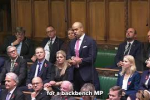
The publication of Dr Swaran Singh’s independent investigation into alleged discrimination within the Conservative Party has made for interesting and at times tough reading for Conservative members.
Allegations of discrimination, particularly racial and specifically Islamophobic, have dogged the party in recent years, and while this report offers a welcome degree of closure to the issue, it also offers a robust and granular view of where there is significant scope to address current failings.
My own experience as a party member spans across multiple associations, as an association executive officer and even as a prospective parliamentary candidate, but across these varied groups I am yet to experience, or indeed encounter, any racism. Even within the febrile atmosphere of social media, particularly Twitter, I am yet to experience any intra-party bigotry.
The findings of Singh’s investigation are thorough and sometimes scathing, pulling no punches in revealing the number of incidents of alleged discrimination and their respective outcomes. It is notable that the investigation details how the party takes an even-handed approach to the handling of all complaints, whether they are anti-Muslim in nature or otherwise. But amid the findings and recommendations it is also important to recognise that the report found no evidence of institutional racism, which is hugely welcome.
While those on the Left continue to bivouac on the moral high ground on matters of race, despite the damning EHRC report into Labour anti-Semitism only last year, the abuse I have endured during my time in politics has always come from the supposedly more “inclusive” end of the political spectrum. A narrative that often depicts black Conservatives with the ugly neo-racism of race-treachery, of “Uncle Toms” and “House Negroes” accompanied by social media memes of tap-dancing cartoon characters that play on the most racist tropes of the American Deep South. This is bigotry that largely goes unseen, or washes over those who are happy to ignore it. To hear it casually used on Good Morning Britain without an eyebrow raised by presenters is astonishing.
The Conservative Party has undoubtedly grown and changed over the course of my lifetime. Where once a non-white Conservative MP would be extremely unlikely, the contemporary party is now more diverse and more representative than at any previous point in its history. Indeed, the Conservative Party has now had double the number of ethnic minority Cabinet members that the Labour Party has had. There are currently as many British Indians around the Cabinet table as the Labour Party have had ethnic minority Cabinet members in its entire history.
Much has been written before of the diversity we have seen in the Cabinet and the great offices of state during this government. More yet has been written by those who view this as the wrong type of diversity, of brown-washing Conservative racism. Accusations that are mired in their own soft bigotry. The belief that black and brown Conservatives lack the agency to forge their own path. But the success that the party has had regarding the diversification of its MPs is indicative of an organisation that has already recognised the need to evolve and is doing so with aplomb.
No political party can claim to be completely free of those with prejudices, be they overt or more pernicious, any large organisation can expect to contain those with unsavoury views. But removing those whose bigotry is known before it can be allowed to fester and spread is a key step to assuaging fears and convincing sceptics that it is an issue being taken seriously.
That the party leadership has committed its time to being subjected to this level of scrutiny should provide a degree of reassurance in that regard, and the fact it has agreed to implement all of Singh’s recommendations in full shows the party’s commitment to improving things where there have been failures.
The findings from the Singh investigation propose deep reforms and provide a welcome chance for the party to assess how best to adapt and address the opportunity to make it a political home for all those who wish to be a part of it. As a party we should welcome measures that can help address existing shortcomings, transform the way the party works and broaden its appeal beyond its core voter base.
While the Conservative Party has not traditionally been seen as a natural home for voters from Britain’s ethnic minority populations, there is no reason why an ideology that speaks to personal responsibility, hard work and aspiration cannot continue to win support from those who feel that they are values which represent them. With the party committed to a levelling up agenda across the country, why shouldn’t a place where talented individuals are able to thrive no matter their background be the most attractive proposition?




